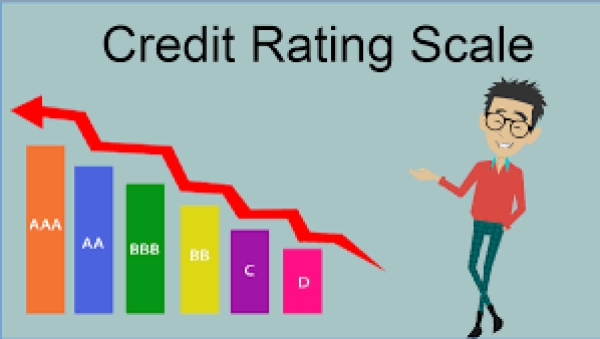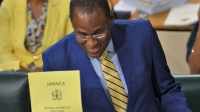A full list of rating actions is at the end of this rating action commentary.
KEY RATING DRIVERS
Positive Outlook: The revision of the Outlook reflects Jamaica's significant progress with debt reduction, despite the pandemic shock, its stability-oriented institutional framework and favorable financing conditions, reinforced by the new IMF facilities. Public debt has resumed its declining trajectory following the temporary increase in 2020 to an estimated 85% of GDP at the end of 2022, below its pre-pandemic level, although still much higher than the current 'B' median of 57% of GDP.
Jamaica's 'B+' rating is also supported by World Bank Governance Indicators that are substantially stronger than the 'B' median. The ratings remain constrained by deep structural weaknesses, including a high crime rate, low productivity and weak demographics, reflected in subdued underlying growth potential, estimated between 1-2%.
Declining Debt Trajectory: Fitch forecasts general government debt to GDP declines to 80% by the end of 2023 and to around 70% in 2026, but meeting the government's 60% debt target by 2028 looks challenging. Sizeable primary budget surpluses are expected to be the key driver of the debt decline.
Strong Policy Framework: Jamaica has a strong, stability-oriented economic policy framework that is built on two key pillars: Bank of Jamaica (BoJ) inflation targeting monetary policy and fiscal policy anchored on debt reduction targets. The policy framework proved flexible enough to cope with the double shocks of the pandemic and more recently the exogenous energy and commodity price shocks. The government has built a track record of fiscal prudence that has gained credibility over recent years and it will be further institutionalized by the new independent fiscal commission which will judge the compliance of the draft annual budgets with the fiscal rule.
Primary Budget Surpluses: The budget balance has improved significantly since 2020, when the pandemic support measures led to the first budget deficit since 2012. According to the latest data, the 12-month rolling balance of the central government was JMD42 billion (1.8% of GDP) in December 2022. Revenues grew by 18% yoy in December 2022, exceeding the growth rate of nominal GDP, while expenditures grew by 12% over the same period. The draft 2023-2024 budget, to be adopted by mid-March 2023, targets a primary surplus above 5% of GDP. The government envisages tight spending control on the expenditure side and improving tax collection, based on enhanced digitalization, to boost revenues. The public sector salary reform will add to expenditure pressures over the next three years, but its cost is forecast to be limited. Fitch forecasts a 4% of GDP primary surplus beyond 2022.
New IMF Financing: The IMF has recently provided access to a total of USD1.7 billion financing. The staff level agreement was reached in December 2022 on the USD960 million Precautionary and Liquidity Line, that can serve as an insurance against downside risks, including extreme weather events, and the USD760 million Resilience and Sustainability Facility supports green projects. Jamaica has no need to issue external debt on the global financial markets given its prudent fiscal stance and low external maturities. The country also benefits from multilateral FX loans at favorable rates, but the interest payments to revenue ratio (three-year average) at 18.3%, is almost double the 'B' median.
Resilient External Sector: Jamaica has had a persistent current account deficit in the range of 1%-4% of GDP. The surge in global commodity prices led to a widening of Jamaica's trade deficit in 1H22 to USD1.7 billion, despite the strong rebound in the tourism sector. The main financing item for the trade deficit is the large surplus on secondary incomes, consisting mainly of remittances from the diaspora. The U.S.-based Jamaican diaspora have increased their remittances in recent quarters, due partly to the relatively large pandemic-related fiscal stimulus in the U.S. Fitch forecasts international reserves at 5.5 months of current external payments at YE 2022, compared to the peer group median of 3.4 months.
Pandemic Recovery, Weaker Growth Outlook: The Jamaican economic activity has recovered from the deep pandemic recession; GDP contracted by 10% in 2020 and growth was 4.6% in 2021 and an estimated at 4% in 2022. The recovery was boosted by the tourism rebound, especially for U.S. stopover visitors, the largest market. Fitch forecasts real growth to slow to 2.3% in 2023 and 2% in 2024, converging towards its medium-term potential rate, estimated around 1%-2% which is weak relative to rating peers.
Inflation Declining From Very High Peak: The global surge in energy and commodity prices drove inflation to a peak of 11.8% in April 2022, declining to 8.1% in January 2023. Core inflation increased more persistently until 3Q22 but also started to decline from 8.5% in December to 7.1% in January 2023. Fitch forecasts inflation to moderate over the forecast horizon, primarily due to BoJ's monetary tightening in the context of the credible inflation targeting regime. Fitch forecasts inflation averages 7.5% in 2023 and to 4.9% in 2024, within the BoJ's 4%-6% CPI target.
Significant Monetary Tightening: The BoJ hiked interest rates by a cumulative 650 bps as the domestic and global inflationary pressures started to intensify after the beginning of the pandemic rebound. The domestic yield curve has increased significantly during the monetary tightening cycle. The longer-term forward rates price in rate cuts starting in 2024, as the market judges that inflation will start to fall towards the inflation target band.
Well-Capitalized Banks: The banking sector is well-capitalized and non-performing loans remained at low levels following the phasing out of pandemic support measures, due to the economic recovery from the pandemic shock. As of September 2022, the capital adequacy ratio was 13.4%, well above the regulatory requirement of 10% and the NPL ratio was 2.5%, below the five-year pre-pandemic average.
ESG - Governance: Jamaica has an ESG Relevance Score (RS) of '5[+]' for both Political Stability and Rights and for the Rule of Law, Institutional and Regulatory Quality and Control of Corruption. Theses scores reflect the high weight that the World Bank Governance Indicators (WBGI) have in our proprietary Sovereign Rating Model. Jamaica has a medium WBGI ranking at the 58th percentile, reflecting its long track record of stable and peaceful political transitions, accountability of the government to civil society and regulatory quality.
RATING SENSITIVITIES
Factors that could, individually or collectively, lead to negative rating action/downgrade:
--Public Finances: Sizeable fiscal deterioration, for example owing to a persistently loose fiscal stance or a marked increase in debt service costs;
--Macro/External: A sizeable external shock that weakens growth and/or external finances, for example, a natural disaster or sharp fall in tourism.
Factors that could, individually or collectively, lead to positive rating action/upgrade:
--Public Finances: Greater confidence in a sustained decline in government debt-to-GDP ratio over the medium term, based on consistent adherence to fiscal rules and further entrenchment of the policy framework.
--Macro/External: Clear evidence of enhanced resilience of economic growth without the emergence of macro imbalances, and of external finances to shocks.
SOVEREIGN RATING MODEL (SRM) AND QUALITATIVE OVERLAY (QO)
Fitch's proprietary SRM assigns Jamaica a score equivalent to a rating of 'B+' on the Long-Term Foreign Currency (LT FC) IDR scale.
Fitch's sovereign rating committee did not adjust the output from the SRM score to arrive at the final LT FC IDR.
Fitch's SRM is the agency's proprietary multiple regression rating model that employs 18 variables based on three-year centered averages, including one year of forecasts, to produce a score equivalent to a LT FC IDR. Fitch's QO is a forward-looking qualitative framework designed to allow for adjustment to the SRM output to assign the final rating, reflecting factors within our criteria that are not fully quantifiable and/or not fully reflected in the SRM.
BEST/WORST CASE RATING SCENARIO
International scale credit ratings of Sovereigns, Public Finance and Infrastructure issuers have a best-case rating upgrade scenario (defined as the 99th percentile of rating transitions, measured in a positive direction) of three notches over a three-year rating horizon; and a worst-case rating downgrade scenario (defined as the 99th percentile of rating transitions, measured in a negative direction) of three notches over three years. The complete span of best- and worst-case scenario credit ratings for all rating categories ranges from 'AAA' to 'D'. Best- and worst-case scenario credit ratings are based on historical performance. For more information about the methodology used to determine sector-specific best- and worst-case scenario credit ratings, visit https://www.fitchratings.com/site/re/10111579.
REFERENCES FOR SUBSTANTIALLY MATERIAL SOURCE CITED AS KEY DRIVER OF RATING
The principal sources of information used in the analysis are described in the Applicable Criteria.
ESG CONSIDERATIONS
Jamaica has an ESG Relevance Score of '5[+]' for Political Stability and Rights as World Bank Governance Indicators have the highest weight in Fitch's SRM and are therefore highly relevant to the rating and a key rating driver with a high weight. As Jamaica has a percentile rank above 50 for the respective Governance Indicator, this has a positive impact on the credit profile.
Jamaica has an ESG Relevance Score of '5[+]' for Rule of Law, Institutional & Regulatory Quality and Control of Corruption as World Bank Governance Indicators have the highest weight in Fitch's SRM and are therefore highly relevant to the rating and are a key rating driver with a high weight. As Jamaica has a percentile rank above 50 for the respective Governance Indicators, this has a positive impact on the credit profile.
Jamaica has an ESG Relevance Score of '4[+]'for Human Rights and Political Freedoms as the Voice and Accountability pillar of the World Bank Governance Indicators is relevant to the rating and a rating driver. As Jamaica has a percentile rank above 50 for the respective Governance Indicator, this has a positive impact on the credit profile.
Jamaica has an ESG Relevance Score of '4' for Creditor Rights as willingness to service and repay debt is relevant to the rating and is a rating driver for Jamaica, as for all sovereigns. As Jamaica had a fairly recent restructuring of domestic public debt in 2013, this has a negative impact on the credit profile.
Unless otherwise disclosed in this section, the highest level of ESG credit relevance is a score of '3'. This means ESG issues are credit-neutral or have only a minimal credit impact on the entity, either due to their nature or the way in which they are being managed by the entity. For more information on Fitch's ESG Relevance Scores, visit www.fitchratings.com/esg





